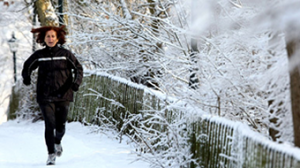
It’s winter! It’s cold and dark and your body just can’t seem to get warm. Aside from that, due to the cold and inclement weather, you are outside much less than the rest of the year. You feel warmer when you eat and since you’re stuck inside, you eat to keep yourself occupied. And even when you are trying your best to keep your eating under control and keep your exercise routine regular, somehow, your weight is creeping up. It’s only natural that our bodies want to warm up. Humans aren’t bears; we don’t need to eat massive amounts of food and then hibernate for the winter, but our bodies do want to maintain a comfortable body temperature, so we tend to want to eat more. Between eating more and having no desire to be active, weight gain will happen. How can we handle it?
Getting Out
You have talked yourself into not going outdoors because of the cold. It’s just cold. It isn’t snowing or raining and the wind isn’t excessive. Stop complaining about the weather! If you go into anything with a negative attitude, then it is pretty much a guarantee that you won’t complete your task. It’s all a matter of how you dress: dress accordingly and once you begin moving outdoors, whether it is brisk walking or jogging, you might even want to peel off a layer of clothing. You will warm up and be more than comfortable. Focus on the positive! The winter sky and air are more refreshing and clear, and with no leaves on the trees, you get a nice view of the sky and terrain in the distance. Just try it once. Go outside and for 10 minutes, commit to not being miserable and instead find something positive to enjoy about the outdoors in winter. The cold weather may even encourage you to move a little fast, which is generally better.
Feeling Down
In winter, we can develop a general lower level of happiness. This is basically low-level dissatisfaction — not depression — that we can get when it’s cold and dark. When this occurs, we are twice as likely to use comfort foods as a pick-me-up than we would under more temperate conditions. In winter, we go for energy-dense, calorific foods, which tend to be sweet or have high fat content. We know that food itself is a comfort as far as mood goes, because it actually impacts the same circuitry of the brain as drugs do. In addition, we secrete more melatonin in the winter. Melatonin is the hormone that controls our day- night cycles in our bodies. It is increased in the winter and that has a negative effect on our getup. It makes us want to sleep more and be lazy. Also, keep in mind that in the winter, Seasonal Affective Disorder (SAD) can hit you. It is real disorder and causes mild depression due to the season you are in. Most people suffer from this much more in the winter.
Plan gatherings with family and friends and schedule time doing activities we enjoy, using natural and true mood enhancers rather than food-based mood enhancement as a quick fix. The sense of true enjoyment and connection we derive from these activities will last longer and help us avoid the health-eroding effects of junk foods.
Vitamin D Deficiency
Vitamin D aids in bone and tooth formation and also helps maintain heart action and proper functioning of the nervous system. It is present in sunlight, fortified milk and orange juice, fish, eggs and butter. The single best way to get a proper dose of vitamin D is to absorb some good old sunshine, as it is produced when ultraviolet rays hit the skin. But in the winter, the hours of sunlight available to us that give us the D that we need are limited and in certain northern latitudes, you just can’t get it. So what can we do? Eat those foods with more D and supplement. Your body needs sunlight to synthesize vitamin D, but with the fewer daylight hours and lower trajectory of the sun, you won’t get enough. Preliminary studies suggest that people with low levels of vitamin D store more fat, though the precise mechanism has yet to be identified. It appears that lack of vitamin D reduces fat breakdown and triggers fat storage, so the calories you consume are stored in fat cells rather than used for energy.
Unlike our ancestors, we live in a time of plenty. Many years ago, we knew ahead of time that food would be scarce in the winter. Our bodies got used to the fact that we needed to store fat for ourselves in order to get through the winter. Nowadays our bodies still want to hold on to our fat stores when it gets cold. But we have an abundance of food available to us and we need to fight this tendency by exercising and eating what we should. Given our propensity to be a little down, a little tired and more inactive, this is a real challenge. But it is not insurmountable and with proper planning and remembering that sometimes we just have to do things we don’t feel like doing, we can overcome our winter malaise.
There are some practical things to do regarding eating that always help in the winter. Try to eat hot meals when possible. Soup is always a great idea. A vegetable soup is healthy with few calories. If you feel like you are getting the “eats” at night, drink hot herbal teas. Getting down on the floor and doing pushups and sit ups or just walking or jogging in place for five minutes is good exercise and will take away your appetite. If you live in an apartment building, go up and down the stairways a few times.
If we gain about 2-4 pounds each winter but shed those pounds each spring it’s acceptable. But if we don’t shed those pounds after the winter and add more pounds each winter, after 10-15 years, we might be carrying 40-50 pounds extra in midlife. So, pay attention! Keep your food in check, exercise even if it is cold outside and get your vitamin D. Because doing so will “add hours to your day, days to your year, and years to your life.”
Alan Freishtat is an A.C.E. CERTIFIED PERSONAL TRAINER and a BEHAVIORAL CHANGE and WELLNESS COACH with over 19 years of professional experience. Alan is the creator and director of the “10 Weeks to Health” program for weight loss. He is available for private coaching sessions, consultations, assessments and personalized workout programs both in his office and by telephone and skype. Alan also lectures and gives seminars and workshops. He can be reached at 02-651-8502 or 050-555-7175, or by email at alan@alanfitness.com Check out the his web site –www.alanfitness.com US Line: 516-568-5027.
The words of this author reflect his/her own opinions and do not necessarily represent the official position of the Orthodox Union.

